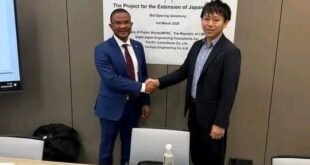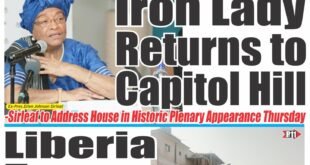Liberia’s controversial Independence Day Orator, Dr. Robtel Nejail Pailey, remains in the news for criticizing the United States, as four commentators debate her speech here.
By Lincoln G. Peters
Monrovia, Liberia, July 30, 2024—Four brilliant Liberian intellectuals have provided their separate perspectives on the orator of Liberia’s 177th Independence Day celebration’s recent criticism of the United States and the embarrassing walk-out of U.S. Chargé d’Affaires Catherine Rodriguez.
In her speech on Friday, 26 July 2024, Orator Dr. Robtel Nejail Pailey said that America has benefited more from Liberia than the latter in their historic ties.
But political commentator and scholar Abdullah Kiatamba, renowned Liberian economist Samuel Jackson, potential student leader Varney A. Jersey, and War and Economic Crimes Court advocate Vandalark Patricks.
During a scholarly debate on a live talk show in Monrovia on Tuesday, July 30th, Liberian economist Samuel Jackson said the orator demonstrated inexperience in her speech, describing her criticism of the United States as divisive, undiplomatic, and anti-American.
According to Mr. Jackson, America has been a sustainable, traditional, and trusted ally of Liberia. Therefore, it’s very premature for the orator to allege that America has benefited more than Liberia has received without providing any research data to substantiate her argument.
For his part, political commentator Abdullah Kiatamba said the speech was great but argued that such an individual remark and assertion doesn’t have the propensity to derail the longstanding traditional and historical diplomatic relationship that Liberia and America enjoy.
“What the orator was telling Liberians is that there is nothing like a special relationship between Liberia and the United States. Therefore, when Liberians are negotiating with America, they should prioritize their interests and demands. Also, I think she should have blamed our leaders, who are Liberia’s greatest threat, rather than just accusing America. Our leaders harm this country the most,” Kiatamba added.
Student leader Varney A. Jarsey extolled the Liberian government for choosing an “independent mind” to speak to the hearts and souls of the citizenry, agreeing with Dr. Pailey that America has exploited and benefited more from Liberia than what Liberia has received from the U.S.
According to him, the US$133 million that the United States government claimed to have spent in Liberia, which has special diplomatic ties, is unfair when America spends US$4 billion in Zambia and other countries.
He said that the United States has modern and renowned universities built in Ghana and other countries in Africa, but Liberia doesn’t have a single educational facility to build Liberians’ capacity. He added that the United States provided Liberia with outdated development infrastructure like the Airport and others that were modernized by China.
“It’s true that the U.S. is spending on Liberia, but the money is taken back to America by expatriates who sent behind those funds. The United States’ opinion is powerful here. America should work with Liberia and see Liberia as a partner. Liberia should be why all African countries should revisit their relations with the US.”
War and Economic Crimes Court advocate Vandalark Patricks disagreed with the United States Government’s response, describing the Independence Day Oration as divisive, and urged the Government of America to uphold what it preaches on paper.
Patricks, an outspoken critic, said the walk-out by CDA Catherine Rodriguez doesn’t reflect the diplomatic etiquette of America, noting that the walkout took away the importance of the message. Editing by Jonathan Browne
 JamzNG Latest News, Gist, Entertainment in Nigeria
JamzNG Latest News, Gist, Entertainment in Nigeria









